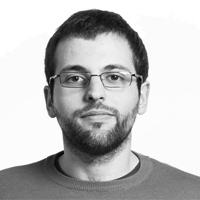Gian Luca Scoccia

Dr. Gian Luca Scoccia is an assistant professor at the Computer Science division of the Gran Sasso Science Institute (GSSI). Previously, I hold a position as post-doctoral researcher at the Department of Information Engineering, Computer Science and Mathematics of the University of L'Aquila, with professors Paola Inverardi and Prof. Marco Autili. In 2019, he received the Ph.D. Degree from the Gran Sasso Science Institute, advised by Prof. Paola Inverardi, Prof. Ivano Malavolta and Prof. Marco Autili. He received (magna cum laude) the Master's Degree in Computer Science from the University of L'Aquila (Italy) in 2014. His research interests include mobile applications, privacy-enhancing technologies and empirical software engineering.
Education
Assistant Professor
Gran Sasso Science Institute
Post-Doctoral Researcher
Università degli Studi dell'Aquila
Visiting PhD Student
Vrije Universiteit Amsterdam
PhD Student
Gran Sasso Science Institute
PhD thesis: "Enhancing Trustability of Android Applications via Flexible Permissions"
Supervisor: Prof. Paola Inverardi.
Co-supervisors: Prof. Ivano Malavolta, Prof. Marco Autili.
Master of Science (BS) - Computer Science
Università degli Studi dell'Aquila
Graduation thesis: "Analisi e sviluppo di un framework per la UI design di applicazioni per dispositivi mobili".
Thesis supervisor: Prof. Henry Muccini.
Bachelor of Science (BS) - Computer Science
Università degli Studi dell'Aquila
Graduation thesis: "Social Discoverer: progettazione e sviluppo un'applicazione java per l'interfacciamento con una wereable sensor network".
Thesis supervisor: Prof. Henry Muccini.
Co-supervisor: Prof. Luigi Pomante.
Publications
A systematic mapping study on automated negotiation for autonomous intelligent systems
Electron vs. Web: A Comparative Analysis of Energy and Performance in Communication Apps
A High-level Architecture of an Automated Context-aware Ethics-based Negotiation Approach
An architecture for ethics-based negotiation in the decision-making of intelligent autonomous systems
Social, Legal, Ethical, Empathetic, and Cultural Rules: Compilation and Reasoning
JavaScript Dead Code Identification, Elimination, and Empirical Assessment
Studying users’ perception of IoT mobile companion apps
Evolution of Kotlin Apps in terms of Energy Consumption: An Exploratory Study
Don’t You Agree with My Ethics? Let’s Negotiate!
Exploring Early Adopters' Perceptions of ChatGPT as a Code Generation Tool/h4>
The state of the art in measurement-based experiments on the mobile web
An empirical study of privacy labels on the Apple iOS mobile app store
How does Migrating to Kotlin Impact the Run-time Efficiency of Android Apps?
Software Engineering Techniques for Statically Analyzing Mobile Apps: Research Trends, Characteristics, and Potential for Industrial Adoption
Challenges in Developing Desktop Web Apps: a Study of Stack Overflow and GitHub
Web Frameworks for Desktop Apps: an Exploratory Study
A self-configuring and adaptive privacy-aware permission system for Android apps
Leave my Apps Alone! A Study on how Android Developers Access Installed Apps on User’s Device
On the Elicitation of Privacy and Ethics Preferences of Mobile Users Visions
Hey, my data are mine! Active data to empower the user
Automated feature identification for Android apps
Permission issues in open-source android apps: An exploratory study
Enhancing Trustability of Android Applications via User-Centric Flexible Permissions
An empirical history of permission requests and mistakes in open source Android apps
An Extensible Approach for Taming the Challenges of JavaScript Dead Code Elimination
An Investigation into Android Run-time Permissions from the End Users' Perspective
User-centric android flexible permissions
Perspectives on static analysis of mobile apps (invited talk)
Awards
Best paper award at MOBILESoft 2020
Distinguished paper award at SCAM 2021
Service
I'm one of the organizers of:
- The 5th International Workshop on Automated and verifiable Software sYstem DEvelopment (ASYDE 2023), co-located with the 38th IEEE/ACM International Conference on Automated Software Engineering (ASE 2023) .
- The 6th International Workshop on Automated and verifiable Software sYstem DEvelopment (ASYDE 2024), co-located with the 39th IEEE/ACM International Conference on Automated Software Engineering (ASE 2024) .
I have served on the program committee for the research track of the following conferences:
- 23rd International Conference on Autonomous Agents and Multi-Agent Systems (AAMAS 2024) .
- 39th IEEE/ACM International Conference on Automated Software Engineering (ASE 2024) .
- 45th edition of the International Conference on Software Engineering (ICSE 2023) .
- 31st ACM Joint European Software Engineering Conference and Symposium on the Foundations of Software Engineering (ESEC/FSE 2023) .
- 32nd ACM International Conference on the Foundations of Software Engineering (FSE 2024) .
I have acted as reviewer for the following conferences:
- International Conference on Software Engineering
- ACM CHI conference on Human Factors in Computing Systems
- International Conference on Software Architecture
- International Conference on Mobile Software Engineering and Systems
- International Conference on the Quality of Information and Communications Technology
- Empirical Software Engineering
- IEEE Transactions on Software Engineering
- ACM Transactions on Software Engineering and Methodologies
- Computers in Human Behavior: Artificial Humans
- IEEE Software
- Journal of Systems & Software
- ACM Transactions on Internet of Things
- Information and Software Technology
- International Journal of Human - Computer Studies
- Software: Practice and Experience
- Journal of Software Engineering Research and Development
- Concurrency and Computation: Practice and Experience
- Journal of Information Security and Applications
- Computers and Security
- Journal of computer languages
Teaching
For the academic year 2023/2024 I taught the graduate level course "Mining Software Repositories" at the Gran Sasso Science Institute.
For the academic year 2023/2024, as part of the Software Engineering group at the Gran Sasso Science Institute, I held lectures in the graduate level course "Engineering Human-centric and Smart Systems".
For the academic year 2023/2024, as part of the Software Engineering group at the Gran Sasso Science Institute, I held lectures in the graduate level course "Introduction to Software Engineering".
For the academic year 2022/2023 I taught the course "Applicazioni per dispositivi mobili" (Mobile application development) at the University of L'Aquila. The course is composed of 48 hours (6 CFU), divided in theoretical lessons and practical exercise sessions.